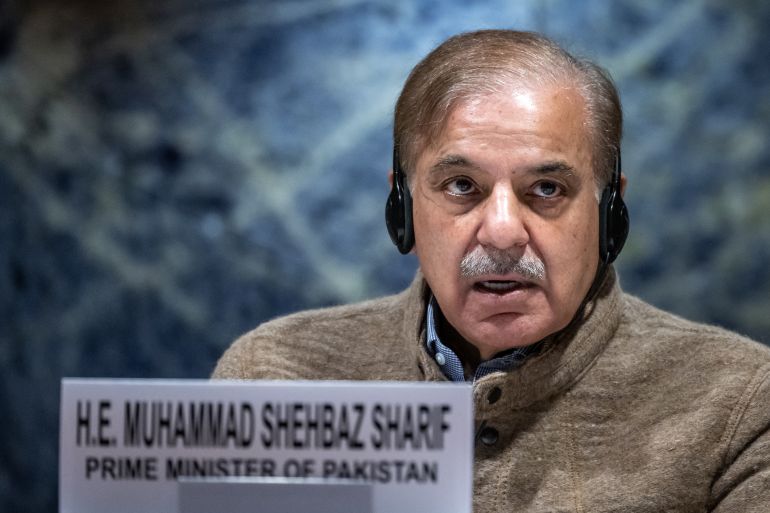Pakistan PM hopeful of IMF deal this month amid escalating crisis
Shehbaz Sharif’s statement comes as Pakistan seeks immediate release of $1.1bn from IMF, part of a $6.5bn bailout package the country signed up for in 2019.

Islamabad, Pakistan – Pakistan’s Prime Minister Shehbaz Sharif is optimistic the country will be able to finalise a critical loan deal with the International Monetary Fund (IMF) this month.
“We are still very hopeful that the IMF programme will materialise. Our ninth review by the IMF will match all terms and conditions and, hopefully, we’ll have some good news this month,” the 71-year-old leader told the Anadolu Agency in an interview on Monday.
Keep reading
list of 4 itemsUAE tells IMF it will support Pakistan with $1bn, says minister
IMF forecasts Pakistan’s economy to slump, inflation to rise
Pakistan says it agrees to IMF terms on release of $1.1bn payout
Sharif talked to Anadolu while on a visit to Ankara to attend Turkish President Recep Tayyip Erdogan’s inauguration after his recent electoral win.
The prime minister’s statement came as Pakistan seeks the immediate release of $1.1bn, part of a $6.5bn bailout package the country signed up for in 2019.
Pakistan last received an IMF tranche as part of the programme in August last year. Despite a 10-day visit by the lender’s delegation earlier this year, the programme, which is set to expire by the end of June, remains stalled.
The country is facing an acute balance of payment crisis as it prepares to announce its annual federal budget on June 9.
Sharif, who also spoke to IMF chief Kristalina Georgieva last month to revive the programme, told Anadolu that Pakistan has met the requirements the global lender asked for.
“We have met all conditionalities. I repeat, each and every requirement of the IMF as prior actions has been met,” he said. “Some of those actions are usually met after the board’s approval, but this time the IMF required that those actions be met before the board’s approval, so we have met them.”
The premier, who came to power last year after his predecessor Imran Khan lost a confidence vote in parliament, said Pakistan was beset with multiple problems, including continuing political unrest and the aftermath of catastrophic floods that hit the country last year.
“Combined with that, we are facing galloping inflation because of the international situation,” he said, mainly referring to the war in Ukraine.
Inflation in Pakistan hit an all-time high of 38 percent last month, while the Pakistani rupee has depreciated by 53 percent since April. According to a recent report by the United States Institute of Peace, Pakistan needs to repay $77.5bn in external debt by June 2026.
Safiya Aftab, an Islamabad-based economist, told Al Jazeera two issues could be hindering the renewal of the IMF programme.
“It seems the IMF has sought to see the upcoming budget documents and the government has said no to that demand,” she said. “The other issue is that IMF has asked for proof of pledges made by bilateral donors for our external financing, which we have not done as yet.”
With a payment of more than $20bn due in the upcoming fiscal year, Pakistan’s options look far and few, said Aftab, adding that Pakistan may have to go back to the IMF for a new bailout package.
“Unless we get an injection of funds in the next few months, either from the IMF or bilateral donors, Pakistan won’t be able to meet its debt obligations and dangers of default are very real,” she said.